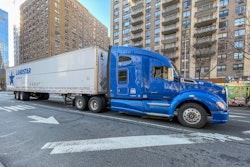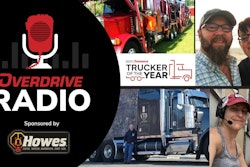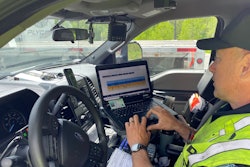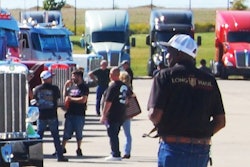Just this year, reports of predatory towing targeting the trucking industry have increased significantly -- ranging from outrageous invoices to alleged assaults of truck drivers, trucks being seized without cause and more. Such stories aren’t just a 2023 development, however. Truckers have been dealing with such practices, and taking the hits, for years.
Reports led the American Transportation Research Institute to initiate a study of predatory towing examining the causes, and countermeasures truckers can take. The report focuses primarily on nonconsensual towing, such as police-initiated towing after a crash, or impound towing when a truck is removed from a public or private property without the consent of the driver.
In total, ATRI’s study consisted of 350 motor carrier survey respondents, as well as 490 towing and recovery invoices from fleets and owner-operators. For the examination, a threshold of 50% higher than the median rate was used to define predatory rates for all equipment and labor costs. A higher threshold of 100% above the median rate was deemed more appropriate for storage rates, as well as the percentage of the total bill invoiced for administrative fees or miscellaneous expenses.

Probably unsurprising to anyone who has been hit with a high tow bill, ATRI found excessive rates to be the most common type of predatory behavior, experienced by 82.7% of motor carriers surveyed. Unwarranted extra service charges hit at No. 2, experienced by 81.8% of carriers.
 Additionally, 29.8% of invoices were identified as containing some form of predatory billing, as outlined in this chart. This percentage only represents predatory billing and does not include other forms of predatory towing, such as vehicle seizure without cause or cargo release delays. It also does not include practices such as fraudulent billing of extra hours, which cannot be determined from invoices alone, ATRI noted.ATRI
Additionally, 29.8% of invoices were identified as containing some form of predatory billing, as outlined in this chart. This percentage only represents predatory billing and does not include other forms of predatory towing, such as vehicle seizure without cause or cargo release delays. It also does not include practices such as fraudulent billing of extra hours, which cannot be determined from invoices alone, ATRI noted.ATRI
More than half of respondent carriers (55.7%) reported a vehicle seizure without cause, which has been widely reported of late. ATRI said this may occur when a tow operator arrives at the scene of a crash or mechanical breakdown unsolicited -- without being called by either law enforcement or the motor carrier. It can also occur when a tow operator impounds a truck that was parked on private property without the authorization of the property owner.
ATRI reported that in the case of private property impound towing, 17 states require that towing operators receive written authorization from the property owner or their agent to remove any given vehicle from the property.
"It is important that property owners identify the specific vehicles deemed improperly parked rather than giving towing operators carte blanche permission to remove any vehicle they believe to be in violation. Additionally, six states have laws requiring that [towing and recovery] companies take pictures of vehicles to prove they were improperly parked before removing them from private property."
Researchers spelled out that, like fleets and owner-operators, towing companies face their own sets of challenges, including expensive equipment, having to respond to accidents around the clock in any weather, accident clearance requirements, and more.
[Related: Tow company defends 'predatory' practices]
Alex Leslie, a research associate with ATRI, noted particularly expensive pieces of towing equipment -- heavy-duty rotators and wreckers -- might only be used a handful of times a year by some companies. The study found that around 45% of towing and recovery companies operate in counties with fewer than 12 annual truck-trailer towaway crashes on the whole.
“If you have a rotator and you’re one of those companies, you may only be using it 11 times a year,” he said. “That is a challenge to recuperate value on those assets.”
ATRI found that excessive bills, too, can't always be blamed on towing companies. For instance, miscommunication between a police officer on the scene of a crash and the responding towing company could result in too much equipment being dispatched to the scene, Leslie said.
“But then, of course, you’ve got towing companies that are just trying to skim off the top,” he added. In crash cases particularly, “they have essentially a captive consumer, so market pressures aren’t able to self-regulate those rates, so that just creates an opportunity for towing companies to either charge higher rates than what is fair or to charge for a bunch of extra line items” and more.
In addition to excessive rates and unwarranted charges, a majority of carriers surveyed encountered additional issues -- truck release or access delays, cargo release delays, truck seizure without cause, and tows misreported as consensual.
[Related: Truckers carjacked, roughed up by towing company: Reports]
While some states have worked to curb the practice of predatory towing, ATRI said the patchwork of municipal, county and state regulations that currently govern towing are often insufficient to prevent predatory activities. The report includes an online compendium of state towing regulations and describes key areas to improve the coverage and application of regulations to close existing loopholes.
ATRI’s report also outlines strategies that motor carriers can use to avoid, identify or address predatory towing, such as how to review invoices for predatory billing and how to gather data to dispute towing companies’ incident accounts when necessary.
In cases of vehicle seizure, ATRI recommends states enact regulations to prevent private property tows without the property owner’s consent. Another strategy for addressing these types of predatory tows, though also outside the control of drivers and fleets, is for businesses that cater to haulers (truck and fuel stops of all types) to take steps to prevent towing and recovery companies seizing vehicles without consent.
Leslie said it’s important for drivers getting towed to take photos and/or video of a crash site, the vehicles involved and the recovery process. “Not just focusing on the vehicle itself, but focusing on what does the roadway look like?” he said. “Are multiple lanes blocked? Are no lanes blocked? Is there one wrecker on the site versus two or three?”
[Related: Trucking fights back against predatory towing: State laws that level the playing field]
He added that drivers should never sign any kind of release or waiver on the highway. “It’s not their responsibility, it’s not their requirement, and that can actually get them into trouble later.” This practice is recommended to cut down on tow operators misreporting nonconsensual tows as consensual to escape restrictions on nonconsensual tows that exist, the report noted.
When it comes to responding to predatory towing issues, particularly those related to excessive billing, owner-operators and motor carriers should be carefully reviewing invoices and looking for charges that are out of whack.
 ATRI published this chart in its report summarizing what it determined to be excessive rate thresholds for certain charges. Leslie noted, however, that those figures vary state-to-state.ATRI
ATRI published this chart in its report summarizing what it determined to be excessive rate thresholds for certain charges. Leslie noted, however, that those figures vary state-to-state.ATRI
“Another thing carriers or their legal representatives can do when reviewing an invoice is check the billed mileage versus what the odometer actually says,” Leslie said. That check could also be “based on what the GPS in the truck says. You can check what the towing company billed you versus what they billed in the past, or what other towing and recovery companies bill in the same area.”
The report also includes a number of strategies and perspectives from legal experts on avoiding predatory towing, how to identify predatory towing practices and more.
Those interested can download the full ATRI report via this link. Stay tuned for further reporting in this series detailing ways to combat predatory actors.
[Related: Tow company defends 'predatory' practices]











